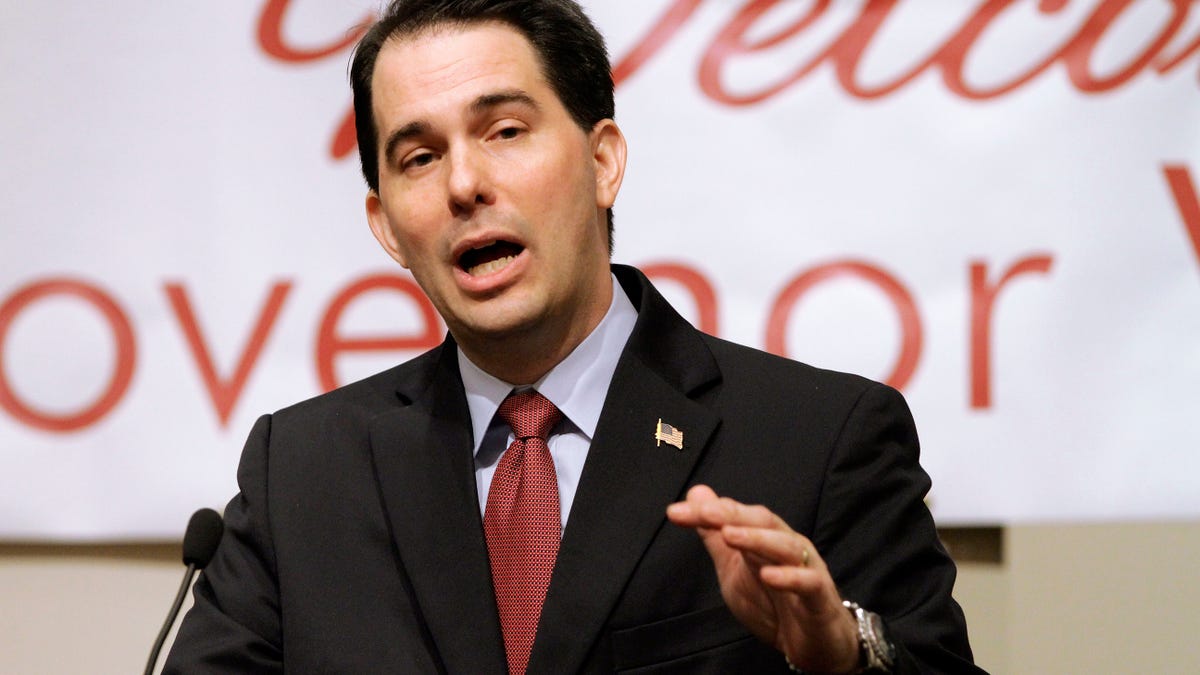
April 17: Wisconsin Gov. Scott Walker speaks to the Illinois Chamber of Commerce in Springfield, Ill. (AP2012)
I grew up in Wisconsin, and still think of myself as a native, even though I live in Virginia.
On Tuesday we’re all from Wisconsin.
A lot hinges on whether Wisconsin voters decide to keep Gov. Scott Walker, or put a Democrat in his place who’s heavily backed by public-sector unions, who’ve been fighting a bitter 18-month battle with Walker. What’s happening in Wisconsin is really a battle for everyone’s future -- and whether government employees are our servants or our masters.
Recent polls suggest Walker may survive the recall effort. Certainly Democrat Tom Barrett’s campaign has largely downplayed the issues that led to the recall in the first place, namely raising the contribution Wisconsin public employees make to their health benefits and pensions, and ending compulsory collective bargaining. Everyone is realizing that Walker’s prediction that passing these two provisions would save the Badger State from insolvency, and return power over their government to voters, is coming true.
Wisconsinites are funny. They love their individuality and their freedom -- which is why Wisconsin is big on the right to bear arms. But they also pride themselves on being progressive-minded. Wisconsin was the first state to allow public sector unions back in 1959. Wisconsin residents never have been instinctive foes of big government -- that is, until big government began to drain them dry.
In 2010 they elected Walker to deal with the issue. Facing a massive $137 million deficit, Walker asked workers like teachers and firefighters to make a tiny increase in the amount they had to pay for their health and future benefits -- less than half what government workers pay on average elsewhere- -- and allow local communities to decide for themselves how much to pay their municipal employees. Otherwise, he said, some 5,500 Wisconsin public jobs would have to go.
The unions screamed no, and pushed back hard. Americans remember the scenes last February, with pro-union demonstrators camping out in the State Capitol, shouting obscenities, scrawling graffiti and trying to intimidate legislators into rejecting any reform that would save their state from fiscal collapse, no matter how tiny. Not very Wisconsin-like behavior. It was, in fact, a preview of Occupy Wall Street -- and, like Occupy Wall Street, it woke up people to what can happen when you hand over power to people who have no stake in your posterity.
The real problem with unions is that they lock employer and employed in a status quo based on the present. They say to their members, “you’ll be able work at this job for this employer, for these wages -- wages we will fight to raise year after year for every employee, regardless of who’s better at his or her job later on, or whether the company is doing well or not.”
The dynamic of economic growth and capitalism, by contrast, is built around the future: anticipating and adapting to changes in the marketplace, incorporating new inventions and technologies to produce more at a lower cost, finding workers who are willing to leave work in an industry that’s unprofitable to go to one that is (just as millions of Americans left dirt poor farms in the 20th century to work in factories and plants).
Families, like capitalism, look to the future. How will we pay the mortgage next month and next year? How can we help our kids to get to college? Will they have a better life than their parents? In 2010 Wisconsin families realized that future was about to be crushed under an avalanche of debts and rising taxes. They asked Scott Walker to find a solution, and he did. The unions fought a brighter future for the sake of a disastrous present -- one that even doomed their own jobs -- and lost.
If Wisconsin families win again now in the recall fight, it will send a clear message to state capitals across the country and Washington: The future is important to us. Step up and save it, as Scott Walker did, and we will reward you by keeping you in office. It will also send a clear message to America’s unions: help us to move this country forward or get out of the way. This Tuesday, we are all from Wisconsin.
